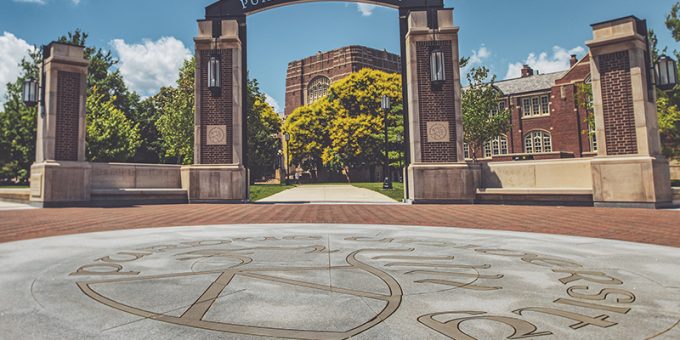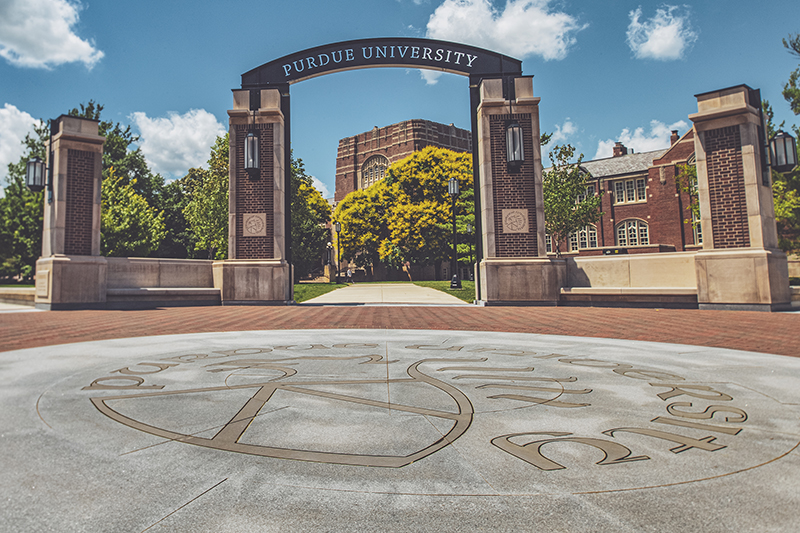
(WEST LAFAYETTE) – Developing new quantum science technologies will be the focus of a new national research effort, with Purdue University playing a leading role.
The work is supported through a broad effort announced by the White House Office of Science and Technology Policy, the National Science Foundation and the U.S. Department of Energy. The effort will include more than $1 billion in awards for the establishment of 12 new artificial intelligence and quantum information science (QIS) research institutes nationwide.

The $1 billion will go toward NSF-led AI research institutes and DOE quantum information science research centers over five years, establishing 12 multidisciplinary and multi-institutional national hubs for research and workforce development in these critical emerging technologies.
Purdue will participate through the Quantum Science Center, which will be headquartered at Oak Ridge National Laboratory (ORNL). The funding for the Oak Ridge-led Quantum Science Center is $115 million over five years.
This funding is a part of $625 million the DOE is awarding for quantum science research. In addition to Oak Ridge, four additional quantum science research centers will also be established at the energy department’s Argonne, Brookhaven, Fermi and Lawrence Berkeley national laboratories, subject to appropriations.
“Quantum science and engineering have the potential to revolutionize the way our society lives and works,” said Theresa Mayer, Purdue’s executive vice president for research and partnerships. “We are honored that Purdue’s experts in the field will join in this collaborative effort to solve grand challenges for our country and world.”
Purdue’s participation in the effort will be led by Yong Chen, Purdue’s Karl Lark-Horovitz Professor of Physics and Astronomy, professor of electrical and computer engineering and director of the University’s Purdue Quantum Science and Engineering Institute (PQSEI), which resides in Purdue’s Discovery Park. Chen also will serve on the center’s Governance Advisory Board.
Purdue is the leading university partner in the Quantum Science Center and already has major research efforts in topological quantum materials, quantum algorithms and quantum sensing, Chen said.
Alexandra Boltasseva, Purdue’s Ron and Dotty Garvin Tonjes Professor of Electrical and Computer Engineering, will lead the workforce development efforts of the QSC and will serve as a member of the QSC leadership team.
“The current quantum workforce is significantly underdeveloped and shorthanded,” Boltasseva said. “The center will engage students and postdoctoral associates in research activities, and cultivate the necessary expertise to ensure the United States leads the quantum revolution.”
In addition to Chen and Boltasseva, PQSEI faculty members participating in the effort are:
- Arnab Banerjee, assistant professor of physics and astronomy.
- Sunil Bhave, professor of electrical and computer engineering.
- Shawn Cui, assistant professor of mathematics and of physics and astronomy,
- Sabre Kais, professor of chemical physics.
- Rafael Lang, associate professor of physics and astronomy.
- Alex Ma, assistant professor of physics and astronomy.
- Michael Manfra, distinguished professor of physics and astronomy.
- Leonid Rokhinson, professor of physics and astronomy.
- Vladimir Shalaev, the Robert (Bob) and Anne Burnett Distinguished Professor of Electrical and Computer Engineering, who will lead the center’s sensors for quantum materials specific aim within the quantum devices and sensing thrust.
- Pramey Upadhyaya, assistant professor of electrical and computer engineering.
- Qi Zhou, associate professor of physics and astronomy.
In addition to Purdue, other participating universities include the University of California, Berkeley; the University of California, Santa Barbara; the University of Maryland; Harvard University; the University of Washington; the California Institute of Technology; the University of Tennessee-Knoxville; and Princeton University.
The center also includes additional national lab partners Los Alamos National Laboratory, Fermi National Laboratory and Pacific Northwest National Laboratory. Industry partners in the center include ColdQuanta, IBM and Microsoft.
“Microsoft is already collaborating extensively with us through Microsoft Quantum Purdue, with Microsoft employees working onsite at Purdue,” Manfra said. “This new quantum center only strengthens the collaborative ties between Purdue and Microsoft.”
About Purdue University
Purdue University is a top public research institution developing practical solutions to today’s toughest challenges. Ranked the No. 6 Most Innovative University in the United States by U.S. News & World Report, Purdue delivers world-changing research and out-of-this-world discovery. Committed to hands-on and online, real-world learning, Purdue offers a transformative education to all. Committed to affordability and accessibility, Purdue has frozen tuition and most fees at 2012-13 levels, enabling more students than ever to graduate debt-free. See how Purdue never stops in the persistent pursuit of the next giant leap at https://purdue.edu/.
About Discovery Park
Discovery Park is a place where Purdue researchers move beyond traditional boundaries, collaborating across disciplines and with policymakers and business leaders to create solutions for a better world. Grand challenges of global health, global conflict and security, and those that lie at the nexus of sustainable energy, world food supply, water and the environment are the focus of researchers in Discovery Park. The translation of discovery to impact is integrated into the fabric of Discovery Park through entrepreneurship programs and partnerships.
About the Purdue Quantum Science and Engineering Institute
Located in Discovery Park, PQSEI fosters the development of practical and impactful aspects of quantum science and focuses on discovering and studying new materials and basic physical quantum systems that will be suited for integration into tomorrow’s technology. It encourages interdisciplinary collaboration leading to the design and realization of industry-friendly quantum devices with enhanced functionality and performance close to the fundamental limits. PQSEI lays out strategies for the design of systems based on these devices in order to bring these new levels of functionality and performance to a vast community of users.
Information Steve Tally, steve@purdue.edu, @sciencewriter



